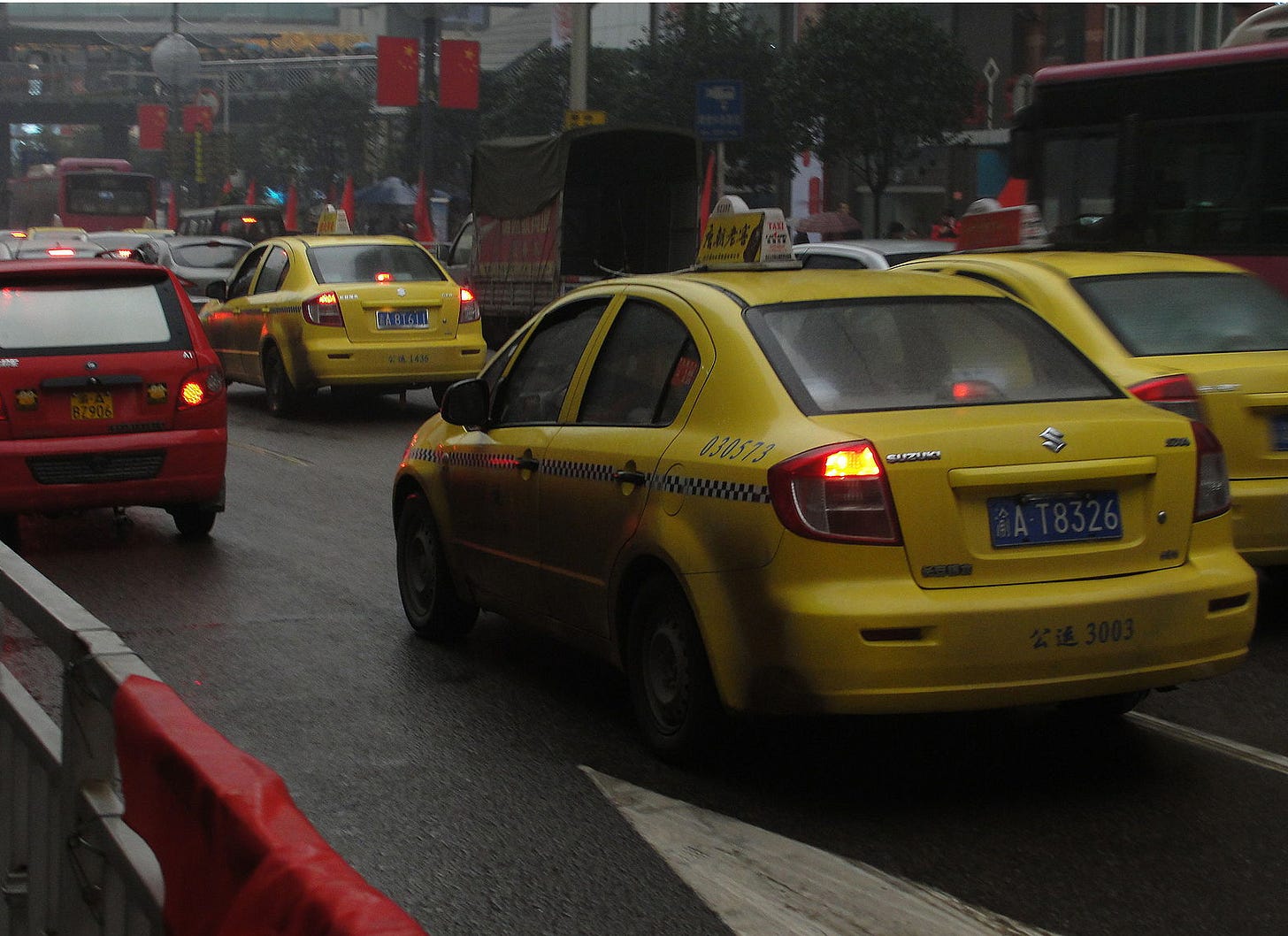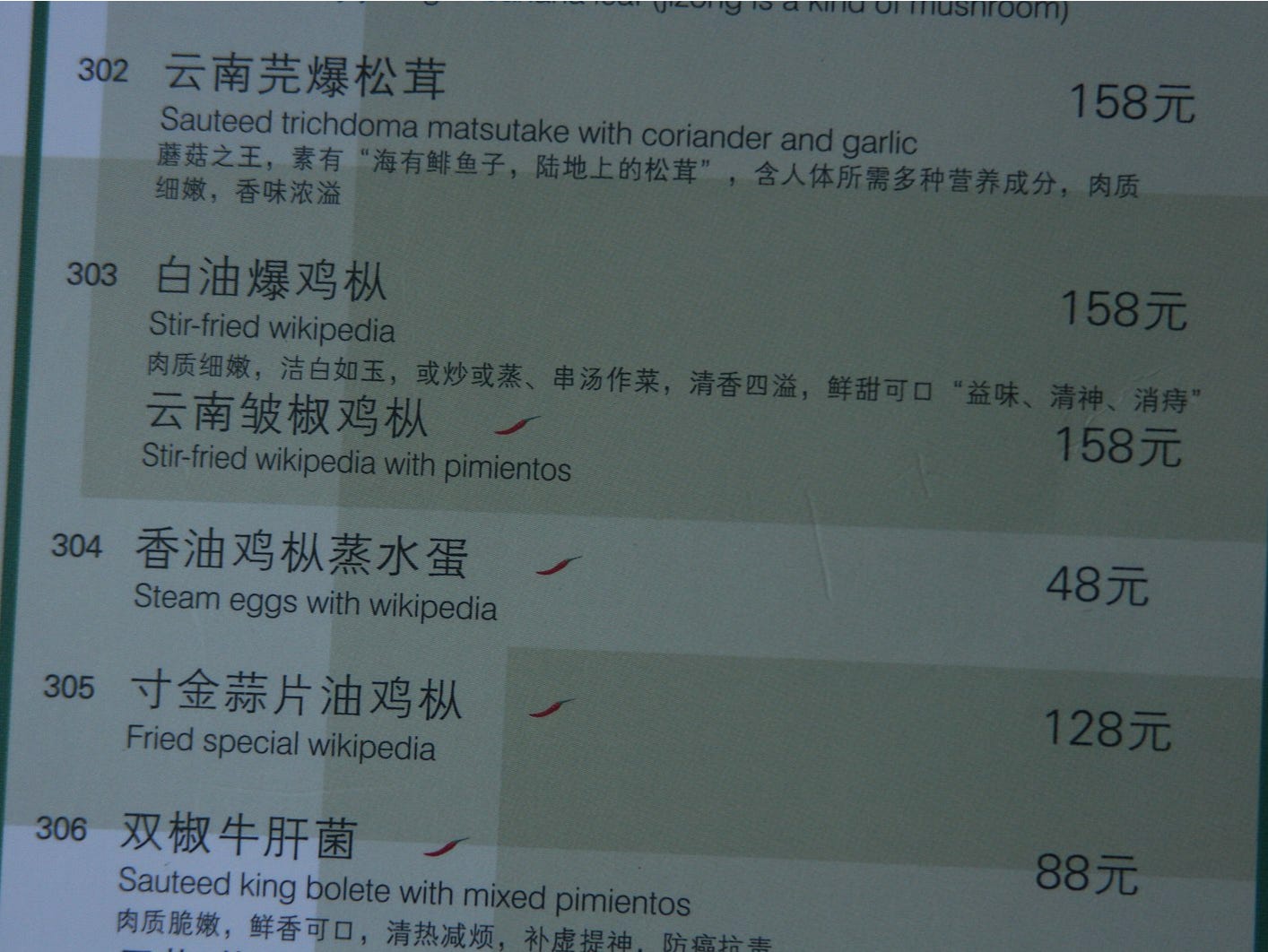Risky business
There's no easy exit from the latest Taiwan crisis without escalating as a first step to deescalating – and, that's, fingers crossed, nothing goes wrong.
Chaos in the Taiwan Strait. Painting: Yim Maukun, WikiCommons.
Taiwan’s foreign minister has accused China of using continuing military drills around and over Taiwan as a warm-up to an invasion, Reuters reports.
According to earlier reports, the drills were scheduled to stop on Monday, but, Tuesday, they’ve continued.
Basically, once you really start stuff like this it’s difficult to know when you’ve made your point.
This is essentially China’s problem – and now everyone’s problem.
"China has used the drills in its military play-book to prepare for the invasion of Taiwan," [Joseph] Wu said at a press conference in Taipei.
"It is conducting large-scale military exercises and missile launches, as well as cyberattacks, disinformation, and economic coercion, in an attempt to weaken public morale in Taiwan.
"After the drills conclude, China may try to routinise its action in an attempt to wreck the long-term status quo across the Taiwan Strait."
As TVBS reporter Tingting Liu (劉亭廷) points out, Wu suggested that China’s drills signify more than just sound and fury.
‘China’s real intention behind these military exercises is to alter the status quo in the Taiwan Strait and the entire region,’ Wu said, ‘China is now determined to link the East & South China Seas through the Taiwan Strait, so that this entire area becomes its internal waters.’
The Wall Street Journal reports that Taiwan is responding with its own drills, known as Tian Lei (天雷), which can be loosely translated as “Heaven’s Thunder” – or “Thunder from the Skies” – take your pick.
Spinning this out into the macro-analysis space by drawing on a highly recommended SupChina interview (Kaiser Kuo – @KaiserKuo – with CIA veteran John Culver – @JohnCulver689), even China knows there’s nothing to be gained by thumping its chest.
But the Chinese are exasperated at continuously hearing that the US Taiwan policy is “infinitely elastic” – Culver’s words as recalled.
Culver said a lot more, remarking that China is in a bind. Does it make its big protest now? He added, Where’s the demarkation line?
Median line is also frequently invoked. Think of the median line as the hedge or wall that separates you from the neighbor you’d prefer not to even have to nod at.
Reuters reports on Taiwan’s exasperation:
The median line in the Taiwan Strait is a tacit understanding that has existed since the 1950s and its existence is a "fact", Taiwan's Defence Ministry said on Monday, after Chinese ships and planes repeatedly crossed it during drills.
But back to Culver’s questions: Does China make its big protest now? Where’s the demarkation line?
The answers to these questions are opaquely nebulous, but we’re likely to see increasing escalation of bluster and obfuscation in the weeks, months, if not years, ahead.
Said Culver (paraphrasing): Everything is different now. This is outright rivalry.
It’s worth repeating: This is outright rivalry.
Diplomacy on the edge
German Ambassador Jan Hecker was two weeks into his new job in Beijing at the age of 54 when he died. Photo: White House.
Ambassadors are more likely to die abroad than people in most other professions – unsourced – but that’s not the take Reuters (among many others) is taking after the fourth ambassador in a year died suddenly on Sunday in the southwestern Chinese city of Kunming.
The obituary for Ambassador U Myo Thant Pe by Myanmar's foreign ministry in a state newspaper on Monday did not specify his cause of death.
Reports the South China Morning Post:
German ambassador Jan Hecker, 54, died in September, less than two weeks into his Beijing posting. Ukraine ambassador Serhiy Kamyshev, 65, died in February during or shortly after a visit to a Beijing Winter Olympics venue.
Philippines ambassador Jose Santiago “Chito” Sta. Romana, 74, died in quarantine in the eastern Chinese province of Anhui in April.
More on ambassadors
Lu Shaye, Chinese ambassador to France. Photo: Twitter via the SCMP.
The South China Morning Post reports that China’s ambassador to France can’t shut up.
In fact, Lu Shaye, Chinese ambassador to Paris, is “doubling down” on comments that frankly don’t have a place in the 21st century (or the second half of the 20th century, or any century, for that matter).
In an interview with French broadcaster LCI that focused on the fallout from US House Speaker Nancy Pelosi’s controversial visit to Taiwan, Chinese envoy Lu Shaye said re-education would be required because the government in Taipei had “indoctrinated and intoxicated” the population with anti-Chinese education.
‘Why do I say ‘re-educate’? Because the authorities of Taiwan have made an education of ‘desinicisation’ on its population, which is effectively indoctrinated and intoxicated. It must be re-educated to eliminate separatist thought and secessionist theory,’ Lu said.
In a second interview broadcast over the weekend with broadcaster Europe 1, he claimed that 20 years ago a majority of Taiwanese were pro-reunification, but the island’s two-term President Tsai Ing-wen, backed up by American support, had poisoned the popular mood towards Beijing.
Err, China poisoned the popular mood towards Beijing and is continuing to do so by carrying out naval incursions and jet flyovers, while threatening invasion and reeducation (Tibetan- and Uyghur-style) while all Taiwan wants is to do elections and drink boba tea.
Taiwan does not need to be re-educated to eliminate separatist thought and secessionist theory. It needs a neighbor that doesn’t want its cake and eat it; it needs a neighbor that has grown out of imperialism as a cup of national success.
What’s wrong with just winning the figure-skating Gold at the Winter Olympics?
Social media ain’t what it used to be (maybe)
Rocket Girl 101 on Weibo night on January 11 2020. Photo: WikiCommons.
The Wall Street Journal (paywall) reports that increasing numbers of social media users in China are wanting “out,” citing the overarching Chinese surveillance panopticon.
ChinaDiction isn’t entirely sure there are any outs, but …
Many are now trying to rebuild social networks on other sites and convince others to join them.
One site that has become popular lately among Chinese-speaking media users is Mastodon, a microblogging network based on open-source software. Mastodon saw an influx of more than 51,000 Chinese-speaking users between late April and mid-July, according to a bot that tracks Chinese users on the network. It is difficult to track usage across social-media sites globally because many companies don’t release international breakdowns of their users.
We wouldn’t advise reading too much into this yet. The Chinese online world is vast and fractious – worse than the warlord era prior to the Japanese invasion and the rise of Chiang Kai-shek and his Nationalists and Mao Zedong and his Communists.
The defections so far don’t seem to be eroding the overall number of users at Weibo and Douban. While both companies lost users in April and May—Weibo lost 27 million and Douban shed 278,000—their numbers have rebounded since then, according to Chinese internet data tracker Analysys. Weibo’s app had 476 million monthly active users in June, and Douban had 11.7 million, according to Analysys.
Seriously? No way does a new social-media play get to platform if ain’t on the party’s stage!
Chongqing, Wuhan experiment with taxis
Taxis still being driven by human beings (we think) in Chongqing. Photo: Limingqimonkey, WikiCommons.
Driverless taxis, actually, in follow up to the headline.
The Financial Times (paywall) reports that Baidu has the permit “to operate China’s first-ever fully driverless licensed robotaxis.”
The internet group said on Monday it would be able to operate its Apollo Go cars without a safety supervisor on board in the Chinese cities of Wuhan and Chongqing.
Winning the permit has given Baidu, the operator of China’s largest search engine, an edge over its rivals, including Pony.ai, WeRide and AutoX, which are racing to develop fully autonomous driving software systems.
The day will come to a China in which silence reigns, the dead welded into their homes, the robotaxis idling the boulevards like lost, pining dogs in search of masters who preceded them in returning from the sleep we all briefly awakened from.
Jaded? Far from it …
Jade. What more can we say? Photo: WikiCommons.
According to the Financial Times (paywall), jade is recovering its luster as an asset class, while property and get-quick-rich investments become less attractive in China.
OK, as the Times admits …
While jadeite’s coarse, reptilian exterior and the market’s heavy reliance on in-person auctions make picking a high-quality stone almost impossible for the uninitiated, investors are buying finished pieces of jewellery as a proxy, said Kitty Chan, a director at the Hong Kong Jewellery and Jade Manufacturers Association.
But …
Myanmar’s coup in February last year and the ensuing civil war disrupted the already limited supply of jadeite. US sanctions against a series of military-linked jade entities in Myanmar, including its chief licenser and regulator Myanmar Gems Enterprise, further crimped supplies.
‘From 1990 to 2000, pretty much when you go to the jadeite market when you resell your piece usually . . . the best you can do is times 1.5 or times 2 [in price],” said [Kitty] Chan, [a director at the Hong Kong Jewellery and Jade Manufacturers AssociationChan.] “But now if you get like a good piece, the price can go up by times 10.’
Or you might end up with one of those “coarse, reptilian” stones that an uninitiated investor might confuse with – jade.
The Greater Sinosphere
Australia
Australian shadow FM ‘considering’ Taiwan trip
Andrew Hastie, Australian shadow foreign minister – he’s the guy in the foreground, not the shadowy thing behind him. Photo: David Birch, WikiCommons.
Sky News reports that Australia’s shadow foreigner minister has been invited to Taiwan and is “considering” it.
‘I’m open-minded to going there. I have a very full dance card... with a young family and enough travel as it is, but certainly I’m on the record that I would like to visit Taiwan at some point, [said Andrew Hastie].
‘They have invited me... I will wait and see.
Yes, exciting stuff.
But in an Australia that wants to embrace its Asian identity, grooming China’s feathers and tickling China’s tummy is important kabuki for a domestic audience which doesn’t know that most of Asia would prefer China was located in another continent.
Penny Wong, Australia’s current foreign minister should be visiting Taiwan,
Hong Kong
Counting down the days – quarantine
The good old days of Hong Kong quarantine, guaranteed to become history as Hong Kong embraces an entirely new approach to airborne pestilence. Photo: WikiCommons.
Hong Kong’s cutting down quarantine to three days and the South China Morning Post reckons that’s the best thing it could be doing.
With daily Covid-19 infections still being reported in the thousands, Chief Executive John Lee Ka-chiu on Monday said he was trying to strike a balance “in the best interests of Hong Kong”, and the new approach would not clash with simultaneous efforts to enable greater cross-border travel with mainland China.
A government source said the ultimate goal was to scrap quarantine altogether but that would require more careful consideration and thorough assessment, as Lee would not want to roll back measures later.
“Eventually we hope to reach zero-quarantine. We cannot promise a timeline yet, but it’s the plan,” the insider said.
The plan makes absolutely no sense, but little that has happened in the past 2-1/2 years in reaction to covid-19 (and now monkeypox etc) has made sense, so good luck Hong Kong.
Linguistics
The AI revolution is coming to a language near you
Artificial intelligence is making ordering food abroad easier. Photo: Bridget Coila, WikiCommons.
Chris Findler, a lecturer of translation and interpretation at National Taiwan Normal University (NTNU) told the Taipei Times he was “pessimistic” – not about translations like the one above in the picture, but …
… about the future of traditional translation jobs’ … Online translators such as DeepL Translator, Yandex and Babylon offer accurate translations in dozens of languages, which means that a human translator may no longer be necessary for some jobs.
Anna Zelinska-Elliot, the director of literary translation at Boston University, says universities should be obligated to prepare translation students for a more technology-oriented profession. She adds that non-literary translation classes should address the impacts that machine translation is having in their field.
Although literary translation is not as impacted by AI, Zelinska-Elliot says that universities should familiarize the students with various online dictionaries, but not necessarily online translators.
Zelinska-Elliot is obviously yet to have any truck with the revelatory, combatant, if not mutinous, feelings that can arise from perusing machine translated language. It can be truly inspirational.
The future, in short, belongs to poets – of old-school languages and codes inspired by vernaculars that become eternal across languages.
Singapore
President paints grim picture of inflationary, geopolitically fractured world
The Straits Times reminds us that Singapore is not lacking global rapport, with a report on Prime Minister Lee Hsien Loong’s National Day speech on Monday this week).
PM Lee noted that US-China relations are worsening, with intractable issues, deep suspicions and limited engagement between the two sides.
This is unlikely to improve any time soon, and miscalculations or mishaps can easily make things worse, he added.
PM Lee said: "More storms and turbulence lie ahead. But do not fear.”
He’s right. Don’t fear.
But do allow yourself panicky moments.
Taiwan
‘Heaven’s Thunder’ – Not the ACDC number
As ChinaDiction reports in our lead story above, Taiwan has responded with its own ‘Heaven’s Thunder’ maneuvers.
It doesn't resolve the issue where Taiwan’s median line now lies.
But it does suggest that nobody is blinking yet.
Then again, a line’s a line: a line; you cross it – it’s no longer a line.
Tibet
Potala Palace closed, Lhasa in lockdown
The Jokhang, Lhasa, Tibet, circa 1992. Photo: Chris Taylor
According to the Financial Times, Lhasa is in lockdown and so is Shigatse, Tibet’s second largest city, due to 18 reported covid-19 cases on the high plateau.
Lhasa, Shigatse and several other Tibetan towns began mass testing residents for the virus on Tuesday. State broadcaster CCTV reported that all of the Lhasa cases were the highly infectious Omicron variant of the virus.
Tibet had until recently been Covid-free and largely spared the strict lockdowns imposed elsewhere in China. The detection last week of four cases of the virus in Burang county, in the region’s west, was Tibet’s first outbreak since January 2020, which comprised just one recorded case.
Yes, there’s the tourism angle – China’s domestic tourism is obviously under assault – but there’s also the “the virus is everywhere” angle.
At ChinaDiction we’ve said this before, but this virus is not stopping for any government policy.
Coda
Scooters, baby
Off we go this mid-week with some of Tom Parker’s (@papagaeio) brilliant work out of Taiwan. I said I’d chat with him – interview – at some point, but who has time for that these days?
In the meantime, check out the pics of Taiwan’s economic-miracle beasts of burden.
There would be no iPhones if there were first no scooters. Think about that.
















